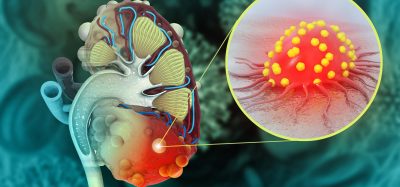New antiviral drug demonstrated to effectively treat influenza in models
Posted: 25 October 2019 | Rachael Harper (Drug Target Review) | No comments yet
A new antiviral drug has been reported in a study that researchers believe has high clinical potential as a next-generation influenza drug.


A new antiviral drug has been reported in a study that induces mutations in the genetic material of the influenza virus and is highly effective in treating influenza infection in animals and human airway tissue. This, according to the researchers, could be a groundbreaking advance in influenza therapy.
The study was undertaken by researchers at the Institute for Biomedical Sciences at Georgia State University, US.
The antiviral drug blocks RNA polymerase, the enzyme that plays a central role in replicating the genome of the influenza virus, causing mutations in the viral genome. If enough mutations occur, the genome becomes nonfunctional and the virus cannot replicate.
“The compound is highly efficacious against influenza,” said Dr Richard Plemper, senior author of the study and a professor in the Institute for Biomedical Sciences. “It’s orally available, it’s broad spectrum against all influenza virus strains tested and most importantly, it establishes a high barrier against viral escape from inhibition.”
…it is very challenging for the virus to find a viable way to avoid the compound”
In the study, the new antiviral drug was tested in ferrets against various strains of influenza. The researchers found that it efficiently inhibited the replication of all of the strains. Virus burden dropped rapidly after treatment and the duration of fever was significantly shorter in treated ferrets than in control animals that did not receive the drug.
“We think that the next generation of influenza antiviral drugs must not only be efficacious and safe, but also address the resistance problem,” added Dr Mart Toots, first author of the study.
Through a combination of conventional and ultra-deep sequencing, Toots has demonstrated, in collaboration with Dr Alex Greninger at the University of Washington, US, that it is very challenging for the virus to find a viable way to avoid the compound.
“We have not identified specific resistance mutations yet and are confident to say that the genetic barrier against viral resistance is high,” Plemper said. “We believe that this compound has high clinical potential as a next-generation influenza drug that combines key antiviral features.”
The findings were published in Science Translational Medicine.
Related topics
Analysis, Drug Discovery, Genomics, Research & Development, RNAs, Sequencing
Related conditions
Influenza
Related organisations
Institute for Biomedical Sciences at Georgia State University, Washington University
Related people
Dr Alex Greninger, Dr Mart Toots, Dr Richard Plemper








